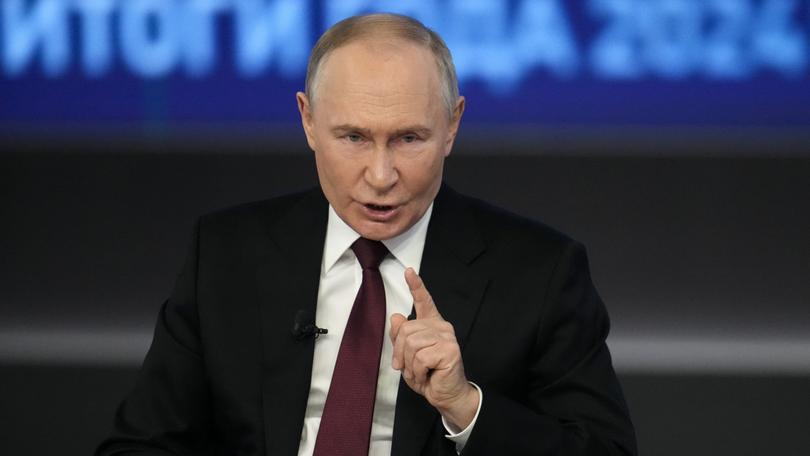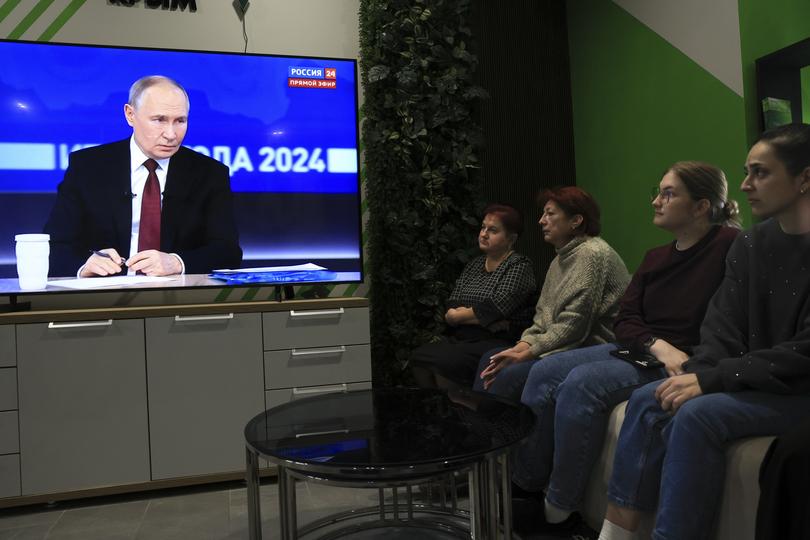Vladimir Putin says he is open to meeting with Donald Trump in end of year message
President Vladimir Putin used his annual end-of-year news conference to deny Russia has been weakened by the Ukraine war and said he is willing to meet Donald Trump.

As Russians endure soaring prices and war fatigue, President Vladimir Putin used his annual end-of-year news conference Thursday to deny that the country had been weakened by its war on Ukraine and the ousting of Syrian leader Bashar al-Assad - and to signal his willingness to meet with U.S. President-elect Donald Trump.
He also promised to ask Assad for the whereabouts of American journalist Austin Tice, who has been missing since his abduction in Syria 12 years ago.
During the marathon news conference, which ran for more than four hours, Putin said he was ready to speak to or meet with Trump at any time, and to negotiate an end to the war in Ukraine. Russian officials, however, have continued to spell out Moscow’s maximalist demands for a peace deal, including ruling out any return of territory and barring Kyiv from NATO membership.
Sign up to The Nightly's newsletters.
Get the first look at the digital newspaper, curated daily stories and breaking headlines delivered to your inbox.
By continuing you agree to our Terms and Privacy Policy.Moscow’s humiliating loss of client Assad has raised doubts about the future of two key Russian military bases on the Syrian coast, the Hmeimim air base and Tartus naval facility, which have enabled Russia to project its military power in the Mediterranean and served as a vital logistics hub for its operations in Africa.
The involvement in Syria boosted Russia’s influence in the Middle East at a time when its global clout was fading - it had been hit by sanctions after seizing Crimea in 2014 and fomenting a military insurgency in eastern Ukraine the same year.
Putin denied that Assad’s fall was a defeat for Russia and claimed that the main reason for Moscow’s military operation in Syria was to prevent the rise of terrorist groups.
“You want to present everything that is happening in Syria as sort of Russia’s defeat - rest assured that is not so,” he told a journalist. “On the whole, we have reached our objective.”
Putin said Russia was in contact with all the main groups in control of Syria and would seek to keep the bases.
“If we stay there, we will need to do something in the interests of the host country,” he said. “What those interests could be, what could we do for them is an issue to be thoroughly examined by both parties.”
He added that Russia would allow the use of the Hmeimim air base for deliveries of humanitarian aid to Syria. Putin said Russia had allowed Iran to evacuate 4,000 fighters to Tehran after Syria’s army offered little resistance to the offensive led by the Islamist rebel group Hayʼat Tahrir al-Sham (HTS).
Putin said that he and Assad had not met since the ousted Syrian leader arrived in Moscow following the Kremlin’s offer of asylum, but that he plans to do so. He also said he would ask Assad for the location of Tice, who was 31 when he was abducted in 2012 while reporting on the civil war in Syria.
“I will definitely talk to [Assad]. I promise that I will definitely ask this question,” Putin said.
Debra Tice, the mother of the U.S. journalist, said Wednesday that she had written to Putin asking him for help in finding her son because of his “profound connections with the Syrian government.” Putin’s comments came in response to an American television journalist’s question rather than as a direct response to the Tice family.
HTS, which now runs Syria’s government, last week offered to cooperate with the United States to search for Tice, a Marine Corps veteran and freelance journalist who worked on stories for The Washington Post and other U.S.-based media outlets. Video footage surfaced months after his abduction showing him blindfolded and held up by men with assault rifles.

On Trump, Putin claimed that he had not spoken to him for more than four years; The Washington Post reported last month that Trump had phoned Putin after his election.
“I don’t know when we will meet, because he is not saying anything about it. ... And I am certainly ready for it any time.,” he said.
Putin denied that, if a meeting took place, he would be in a “weakened” position because of the Ukraine war and Russia’s loss of Assad in Syria.
“I believe that Russia has become much stronger in the past two or three years. Why? Because we are becoming a truly sovereign country,” Putin asserted. “We depend on few people. We are able to stand on our own feet from an economic point of view. We are strengthening our defense capability.”
After almost three years of war in Ukraine, and with Russia’s economy showing the strains of prolonged Western sanctions, Putin sought to reassure citizens tired of the conflict and angered by rampant inflation that Russia was winning and that its economy was stable and growing.
But amid prices so high that some supermarkets are locking up butter to prevent theft, he admitted that Russia’s inflation rate of 9.3 percent - which he said had been given to him Wednesday by the Central Bank chief - was “an alarming signal.”
“The situation is stable and secure overall,” said Putin, who has largely dedicated Russia’s economy to wartime production, pumping out weapons. Military and security spending is projected to reach around 40 percent of the budget next year.
The bank’s governor, Elvira Nabiullina, has faced mounting pressure from corporate leaders warning that interest rate increases, designed to combat inflation, will lead to a rash of bankruptcies and could trigger an economic crisis next year.
In the highly choreographed question-and-answer session, anchor Alexandra Suvorova began by suggesting that war and economic crises were “off the charts” all around the world, asking Putin: “How does Russia manage not only to stay afloat but also to continue growing?”
Putin responded by saying that Russians grew “bored” when life was stable but expressed horror when bullets were flying, implying that they should calm down because things were not as alarming as many thought.
“You know, when everything is calm, measured, stable, we get bored. Stagnation. We want some action. As soon as the action starts, everything whistles by our temples. … Unfortunately, bullets are whistling now. We are so scared. … But not horror, horror, horror.”
Russians sent more than 2 million messages and questions to Putin, most about health care, high prices and social welfare benefits, according to Russian state media.
© 2024 , The Washington Post
